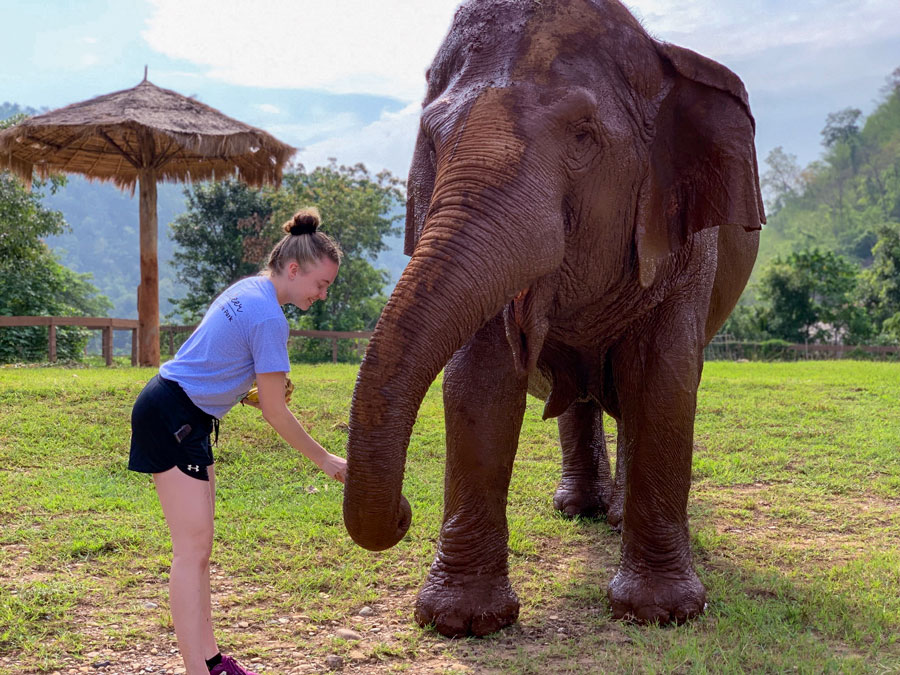ALMA – Hannah Litzen recently returned home from a two-week trip to Thailand where she volunteered at a dog rescue clinic and elephant nature park.
An 18-year-old animal biology major entering her second year at the University of Guelph, Litzen has wanted to be a small animal veterinarian since she was three years old.
She is currently spending her second summer working at the Sauble Beach Pet Hospital.
“I can’t really explain why I want to be a vet, but something in me has always been fascinated about veterinary medicine, anatomy and animals in general,” she said in an email interview.
“I already knew I wanted to be a vet going into the trip, but the trip allowed me to get actual surgical and technical experience, which furthered my desire to become a vet.”
She found out about the Loop Abroad program through Instagram.
“I was looking for an opportunity to travel and work with animals and this was perfect,” she said.
Loop Abroad uses a study abroad model instead of a “voluntourism” model.
“Loop focuses on educating its students so that they can contribute and serve in meaningful ways,” states an organization press release.
“It also works with locally-run animal welfare organizations so that students contribute to long-term improvement on the ground in the countries they visit.”
The organization offers trips to Thailand, South Africa, Australia and the Amazon and Galapagos.
“Thailand was their original destination,” Litzen said. “It has always been a bucket list trip (hot temperature, dynamic culture, beautiful scenery and rainforest, and very far away) and many of the activities that I wanted to do were unique to the Thailand trip.”
There were about 40 people in Litzen’s group, which travelled to Thailand from May 18 to June 3. She spent the first week at an elephant nature park and the second week at a dog rescue clinic.
The elephant nature park is home to about 80 elephants, Litzen said, but there are also dogs, cats, horses, goats, pigs and sheep.
‘Incredible experience’
“It was (an) incredible experience and I wouldn’t trade it for the world,” she said. “If anyone has the chance I would encourage you to go there and stay as a volunteer to get the true experience.
“Seeing animals within this natural habitat, doing activities that you would usually only see in the wild is much, much better than any riding camp where you get to ride them while they are treated poorly and are depressed from poor handling and the inability to perform natural behaviours.”
The elephants at the sanctuary come from a variety of places but Litzen said most are rescued from riding camps, circuses, entertainment shows and logging facilities. She said many can be released back into the wild but some will make the sanctuary their permanent home if they’ve been injured and are unable to live on their own.
Litzen said she wasn’t intimidated by the pachyderms.
“We had guides with us at all times and most of the elephants were fairly used to people walking around and were very gentle,” she said.
One of her most memorable experiences was participating in a diet study.
Participants spent the entire day with one elephant and tracked its eating habits. At that point Litzen had time to speak to her elephant’s mahout (keeper).
“He was very interesting,” she said.
While the group was in Thailand during the beginning of rainy season, Litzen said it didn’t rain much and it was very hot and humid.
“Takes a lot out of a person when you’re working all day in the heat,” she said.
During her second week in Thailand, Litzen worked at a dog rescue clinic outside Chiang Mai.
“Many of the dogs have owners and are simply brought in because they can’t afford animal care,” she explained. “Many are in very poor condition, but many are still well loved.
“The shelter also takes in animals off the streets and gives them a full veterinary workup to get them back to full health. Then they can be rehabilitated.”
During her week at the clinic, Litzen was given the opportunity to help neuter and spay cats and dogs.
“I would probably say the hardest thing would be taking blood,” she said. “It takes a lot of practice to spot out a little vein under a bunch of hair but I have been getting some more experience with that at my clinic.”
The group worked with American veterinarians who provided a lecture in the morning to explain various topics before the hands-on experience in the afternoon.
While in the city Litzen said the group went to night markets, temples and zip lining on the weekends.
She said her biggest takeaway from the trip was, “getting to learn about what elephants have to go through and how unbelievably wise they are.”
She also enjoyed “the chance to experience the calm and friendly nature of Thai people and their beautiful culture.”
She added, “I hope to take some of their ways and apply them to my everyday life.”




